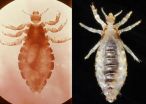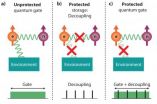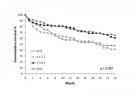(Press-News.org) Athens, Ga. – Black flies drink blood and spread disease such as river blindness—creating misery with their presence. A University of Georgia study, however, proves that the pesky insects can be useful.
Don Champagne, an entomology professor with the UGA College of Agricultural and Environmental Sciences, discovered a way to use the black fly's blood-sucking tactics for medical advancement. The results of his research were published in the journal PLoS One.
"In order to feed on blood, these insects have to contend with our natural defense agents against blood loss—like clotting," he said. "Many insects use salivary injections packed with proteins to inhibit the enzymes in our bodies from reacting the way they normally would to injury."
In order for insects to earn a blood meal, they have to override the human body's battery of defenses. Most of these insects have anticoagulants to fight off clotting, inhibitors to stop clumping of platelets and vasodilators to speed up blood flow at the bite site.
"As it turns out, there are also a lot of things in saliva that modulate the immune response like inflammatory responses and downstream immune responses," he said.
A few years ago, Champagne worked on a study transcribing the messenger RNA that codes for proteins found in the salivary secretions of the black fly. He found two proteins that looked like they could hinder clotting. Champagne determined that one of these inhibits the clotting cascade by blocking factor Xa. Clotting factors exist in the blood in an inactive state, waiting to be called into action. Because these factors work like dominos, if factor X fails to be turned on (converted to Xa) the rest of the responses stay inactivate.
"We were able to show that the salivary protein targets Xa and is a good inhibitor of clotting," he said about his recent research. "But, it is an even better inhibitor of some enzymes involved in very early immune response—elastase and cathepsin G."
These enzymes are able to kill bacteria, and they help drive the inflammatory response.
"We were expecting these to be anticoagulants, that wasn't a surprise," he said. "But, we were surprised to learn that the protein affected all of these other responses."
This discovery made the protein attractive as a potential drug target, possibly one to treat patients recovering from heart attacks.
"Inflammation is a major source of tissue damage associated with vascular injuries," he said. "The idea of a single factor that could both inhibit clotting and inhibit damaging inflammation responses at the same time is pretty novel and interesting."
Studying black flies is easier at UGA than anywhere else, because UGA has the only black fly colony in the world. The flies in the lab aren't the same ones who transmit the debilitating river blindness disease, but the unique resource enables important research about the transmission of river blindness.
"We are not rearing black fly vectors; they are not being infected with the parasite that causes river blindness; and there is no risk to the public," he said.
What they are doing is learning more about how the disease is transmitted and how to possibly stop it.
"A lot of blood feeders also vector diseases," Champagne said. "When they are playing all of these tricks on the host in order for them to get a good blood meal, they change the conditions at the point where these pathogens go into the skin. Those changes often favor the pathogen. In an environment where normal wounding responses and defenses are inhibited, the pathogen can go in and say 'oh, look at that—the door is wide open."
Black flies vector river blindness while drinking their blood meal. A threat in sub-Saharan Africa, river blindness is a parasitic disease caused by a nematode infection. It's not caused by nematodes themselves. A symbiont that the nematode releases when it dies triggers an inflammatory response that causes changes in the skin and chronic inflammation. Eventually, the symbionts migrate through the eyes, causing the cornea and lens to cloud and leave infected people blind.
"These salivary factors change the environment for the parasite so it's conceivable that knowing about this protein would allow us to target it in some way, maybe by vaccinating against it, and that would likely make it less favorable for the transmission of river blindness," he said.
###For the full journal article, see http://www.plosone.org/article/info%3Adoi%2F10.1371%2Fjournal.pone.0029964.
Black flies may have a purpose after all
2012-04-10
ELSE PRESS RELEASES FROM THIS DATE:
Sexual reproduction brings long-term benefits, study shows
2012-04-10
Courtship rituals can be all-consuming, demanding time and effort – but now scientists have discovered why it might be worth it.
Attracting a mate – which can take significant effort, such as in a peacock's show of feathers or the exhaustive rutting of stags – can produce benefits for a species in the long term, a study suggests.
Scientists have shown that animals and plants which reproduce sexually are at a considerable advantage to those species – such as some insects and reptiles – that reproduce without a partner.
Researchers at the University of Edinburgh studied ...
Genetic regulator of fat metabolism and muscle fitness discovered
2012-04-10
While exercise is accepted universally as the most beneficial prescription physicians can write for patients, little is known about the molecular mechanisms that generate its widespread health benefits. Researchers from Case Western Reserve School of Medicine have shed light on this mystery by discovering that a genetic factor, Kruppel-like Factor 15 (KLF15), governs the body's ability to burn fat during exercise.
Previous research from the laboratory of Mukesh Jain, MD, FAHA, identified the importance of KLF15 in the metabolism of two of the three basic nutrients used ...
Head and body lice appear to be the same species, genetic study finds
2012-04-10
CHAMPAIGN, Ill. — A new study offers compelling genetic evidence that head and body lice are the same species. The finding is of special interest because body lice can transmit deadly bacterial diseases, while head lice do not.
The study appears in the journal Insect Molecular Biology.
Scientists have long debated whether human head and body lice are the same or different species. The head louse (Pediculus humanus capitis) is a persistent nuisance, clinging to and laying its eggs in the hair, digging its mouthparts into the scalp and feeding on blood several times a ...
A bit touchy: Plants' insect defenses activated by touch
2012-04-10
HOUSTON -- (April 9, 2012) -- A new study by Rice University scientists reveals that plants can use the sense of touch to fight off fungal infections and insects. The study, which will be published in the April 24 issue of Current Biology, finds that plant defenses are enhanced when plants are touched.
"From previous studies, we knew that plants change their growth in response to touch but we didn't know how these growth changes were activated," said Wassim Chehab, a faculty fellow in Rice's Department of Biochemistry and Cell Biology and lead author of the new study. ...
Opening the gate to robust quantum computing
2012-04-10
AMES, Iowa -- Scientists have overcome a major hurdle facing quantum computing: how to protect quantum information from degradation by the environment while simultaneously performing computation in a solid-state quantum system. The research was reported in the April 5 issue of Nature.
A group led by U.S. Department of Energy's Ames Laboratory physicist Viatsheslav Dobrovitski and including scientists at Delft University of Technology; the University of California, Santa Barbara; and University of Southern California, made this big step forward on the path to using the ...
O'Reilly Collins Wins $4.6 Million Verdict in Insurance Bad Faith Case
2012-04-10
On March 28, 2012, O'Reilly Collins obtained a verdict in favor of its client, Stephens & Stephens XII, LLC, and against Fireman's Fund Insurance Company for $4,673,125.10 for failure to pay an insurance claim.
Stephens' warehouse was stripped of copper wiring, causing over $2 million electrical and mechanical damages. Stephens was notified of the theft on July 1, 2007 by the Richmond police who apprehended two thieves. Stephens promptly notified its insurance company, Fireman's Fund, of the loss and asked to pay for the repairs. Fireman's Fund initially promised ...
Life expectancy may affect when you get married, divorced, have kids: Queen's University study
2012-04-10
Major life decisions such as marriage, divorce, abortion, having a child and attending university may be subconsciously influenced by how long people believe they will live, according to a Queen's University study.
"Life expectancy might be driving all of these major decisions," says Daniel Krupp, a post doctoral fellow in the Queen's math department who has a background in psychology and biology.
The longer someone expects to live, the more time they will invest in education. If life expectancy is short, someone may decide to get married and have children sooner, or ...
Caution needed when curbing overuse of healthcare resources, study suggests
2012-04-10
NEW YORK, April 9, 2012 – In the current hyper-charged United States healthcare debate, the focus on lowering cost without compromising quality of care remains a priority. But according to a new study by researchers at NYU Langone Medical Center and colleagues, one common approach may have serious unintended consequences.
Funded by the Robert Wood Johnson Foundation's (RWJF) Clinical Scholars program and the United States Department of Veterans Affairs (VA), the study, which appears today in the April issue of Health Affairs, examines the potential impact of policies ...
Heart failure patients with diabetes may benefit from higher glucose levels
2012-04-10
Lowering glucose levels for people with diabetes is normally critical to improving health outcomes. But for those with heart failure, that might not always be the case, say UCLA researchers.
A new study found that for advanced heart failure patients with diabetes, having higher blood glucose levels may actually help improve survival rates.
Currently published online in the American Journal of Cardiology, UCLA researchers compared levels of a marker used to track glucose levels called glycosylated hemoglobin in advanced heart failure patients with and without diabetes. ...
New Jersey Attorney Hanan M. Isaacs Featured Speaker for West LegalEdcenter CLE: E-Discovery and Evidence in the Era of Social Media
2012-04-10
Techniques for leveraging e-discovery and social media evidence. The West LegalEdcenter webinar will include discussions on the importance of e-discovery and social media evidence and how to use it as leverage in civil and criminal litigation. Mr. Isaacs, a New Jersey attorney, mediator, and arbitrator, will provide techniques for obtaining e-discovery and uses for social media. He will also cover material on the recent privacy invasion and bullying issues that resulted in the Rutgers University student's criminal trial and guilty verdicts.
Hanan M. lsaacs, M.A., J.D., ...



